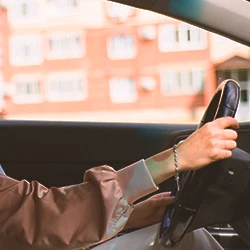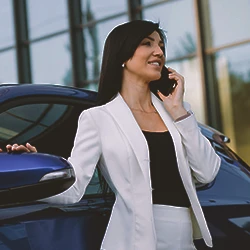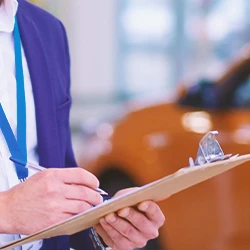When we lend our car to a friend or family member, we should consider what could happen if they damage the car.
I have years of expertise as a car accident attorney, and I can tell you that the cause of the accident will most likely be determined by who is to blame.
Here's what happens in detail.
Quick Summary
- If the other driver causes a car crash, they will be liable for the damage. If they are not insured, you can sue them and try to get money from their personal assets.
- If someone else is driving your car and causes an accident, your insurance will likely cover initial damages to other drivers or property.
- If your insurance doesn't cover the entire claim, the other driver's policy may cover some liability and medical expenses.
What Happens if Someone Else Gets in a Car Accident with My Car?

Suppose they're not covered under your vehicle insurance unless you've specifically excluded them or used your automobile without permission—in that case, they're probably covered under the car owner's insurance policy unless you've specified otherwise.
However, coverage by the insurance company varies by state and company. It also depends on the accident's kind and degree of damage. The insurance you choose should protect you if an accident occurs.
The best way to think about car insurance is as coverage for your vehicle. Your car insurance is intended to cover your car, even if you are the policyholder. When you're driving your car, your carrier will probably pay any person you name on your policy, as well as those who may drive it in the case of an accident.
Related Article: Car Accident Lawsuit
Who Is Liable if the Other Car Owner Causes a Car Accident?
If the other car owner causes a car accident, they will be liable. If they're not insured, you can sue them and try to collect them from their personal assets. However, if the other driver doesn't have any assets, pursuing a lawsuit may not be worth your time and money.
When lawyers talk about "liability" for a car accident, they're referring to the legal responsibility to pay financial compensation for the injuries inflicted on an accident victim. Usually, the payment comes from the at-fault driver's insurance.
What if Someone Else Drove My Car and Caused the Crash?

Two types of car insurance policies will apply in this situation. The first is "liability insurance," and the second is "collision insurance."
Liability Coverage
If someone with the authority to drive your vehicle is at fault for an accident, the people they harmed will file an insurance claim against your policy.
For the damaged or injured parties, your liability coverage would cover medical bills and property damage [1]. The claim will be considered yours and could raise your rates. You'd be responsible for all of your deductible expenses.
Liability insurance is the state-required insurance you must have to protect other drivers financially if you cause an accident. Liability coverage shields you against physical injury and property damage.
Collision Coverage
As I previously said, auto insurance is generally restricted to the vehicle, not the driver. Therefore, if another person damages your automobile, you must submit a claim with your collision primary coverage provider to repair it.
Your collision coverage plan is designed for your car—it wouldn't make sense for someone else's car to be covered if theirs wasn't damaged in an accident. In the event of a collision, whether you were at fault or not, your vehicle is protected by collision coverage.
How Does Insurance Apply When Someone Else Drives Your Car?

Although this might not seem like a big deal if the accident is minor with no injuries, things can quickly get complicated if the accident is major. Let's explore some of the different ways accidents can happen and how they affect your insurance policy.
When the Person Driving Your Car Has Their Own Insurance Policy
If the person driving your car has their own car insurance policy, their coverage may supplement your insurance. Although some people think that a non-owner driver is entirely responsible, your own driver's insurance would still cover the damages first. For example, if your friend is driving your car and causes an accident while they are the at-fault driver, then your car insurance typically pays for it.
However, most policies only cover up to a certain amount of money. If the total cost of the accident goes above this limit, then your friend's insurance may have to chip in.
When Your Car Insurance Doesn’t Cover Someone Else’s Accident

- Lack of permission
- Special situations
- Non-valid driver's license
- Household members
- Commercial activity
"One issue you may not have expected is if someone steals your car and causes an accident. If it's a stranger, you will not be held liable for the other person's injuries, if there are any. Still, your collision coverage will be used to pay for your car's damages."
- Tad Thomas, personal injury attorney
What Should You Do After Someone Else Crashes Your Car?

Call a Car Accident Attorney
If you are in a car accident, the best step is to contact a lawyer. Every car accident is different, so you might need legal help based on your situation. If someone else was driving your car and the accident wasn't their fault, you can get money for the damages.
Understand Your Coverage
In addition, review your insurance coverage to determine what is considered your primary insurance and what isn't covered. Your personal injury lawyer can also help with this task.
Document the Accident
After an accident, it is important to call the police. This is both a legal requirement and a good way to make sure that you have a record of what happened to your insurance claim.
Related Article: Is Hitting Road Debris an At-Fault Accident?
See all related personal injury and accident lawsuits we've taken on.
FAQs
1. Under what circumstances can my insurance refuse to pay for an accident?
Your insurance can refuse to pay for an accident when the driver took your car without your permission, has been dropped from your insurance policy, is under the influence of drugs or alcohol, doesn't have a valid license, or isn't permitted to drive.
2. What if someone took my car without permission and had an accident?
If someone took your car without permission and had an accident, you will not be liable. However, if you lent your car to someone not covered under your insurance policy and they got into an accident, then coverage may apply.
3. What happens if someone else without insurance is driving my car and gets in a car accident?
You will be held liable if someone else who is uninsured is driving your car and gets in a car accident. You will have to pay for any damages out of your pocket. Therefore, you must always check if the person driving your car is insured.
Related Article: Can You Sue a Towing Company for Damages?
Do you want to prove liability in a car accident?
If you were in a car accident, even if you weren't driving, you may be able to get compensation. Schmidt & Clark, LLP law firm can help you pursue the money needed to cover your damages.
With over years of experience helping car accident victims, our personal injury attorneys know what it takes to win a case. Contact us today for a free consultation to discuss the details.
Reference:
- https://www.allstate.com/resources/what-is-liability-coverage

 Published by
Published by